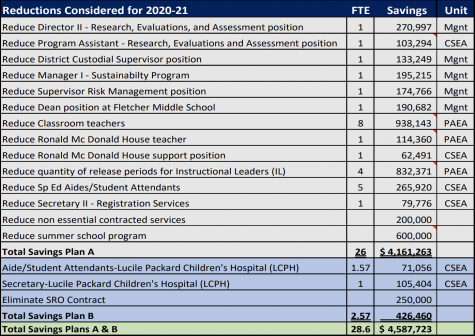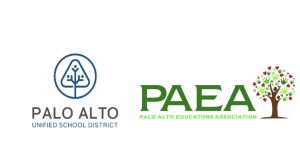District predicts grim budget
May 29, 2020
Following the budget discussions from the May 26 district board meeting, the Board of Education is predicting a grim budget scenario for the Palo Alto Unified School District’s coming fiscal years.
Based on a presentation during the board meeting by PAUSD Chief Business Officer Carolyn Chow, information on expenditures and revenue intake for budget development have been updated in more detail since the original presentation two weeks ago.
Additives to the list of expenditures include the Fund 13 Child Nutrition contribution and the reopening/reconfiguring of school for the 2020-2021 school year, each forecast to be a $500,000 expenditure increase, according to Chow.
Based on the results of the state’s May Revise, the ten percent reduction of Local Control Funding Formula to Minimum State Aid, or reduction of uniform grade span grants for school districts, will lead to a $1 million expenditure increase for the district, Chow said.
The rate increases from the retirement agencies State Teachers’ Retirement System and Public Employees’ Retirement System that previously netted about a $2.8 million expenditure increase for the district are proposed to be reduced in the coming years based on the May Revise. Instead, the district would save approximately $700,000 in expenditures, resulting in a $3.5 million net decrease, according to Chow.
The combined total of these new factors creates a net decrease of roughly $1.6 million, causing total expenditures to drop from about $9.9 million previously to approximately $8.3 million for the upcoming school year, Chow said.
Proposed considerations for budget reductions have been updated in more detail since two weeks ago; based on the presentation, the reductions would include layoffs and several cuts in programs and contracts.

The presented items contribute to a total savings of about $4.6 million, cutting the expenditure costs to about $3.7 million, according to Chow.
During the board meeting, several Palo Alto residents voiced concerns for these reductions.
Lauren Williams, a PAUSD elementary school parent, argued against the proposed layoff of the district custodial supervisor.
“Given the global pandemic that is ongoing with no guaranteed timeline for reliable treatment or vaccine site, the elimination of any position focused on cleaning and disinfecting our students’ classrooms is a critical error,” Williams said. “Reducing this position will leave all of our elementary school sites at an extreme disadvantage when it comes to ensuring our campuses and classrooms are safe spaces for our students.”
Joslyn Leve, environmental action chair for the Parent Teacher Association Council, voiced concerns about the proposed layoff of the Manager I-Sustainability position, a staff position responsible for overseeing environmental goals and resource conservation as part of the sustainability management program itself.
“There are programs that are currently being run at the elementary and the other levels that really need a point person in the district to communicate what the district is doing, to the parent and staff volunteers, and vice versa,” Leve said. “We can’t be so short sighted that in this short term, which may go on for a couple of years, COVID situation, that we also forget about further long term goals, which relates to being sustainable.”
Elizabeth Gardner, a parent at Barron Park Elementary School, spoke out against the layoffs of three certificated staff members and potential resource specialist/aid cuts at Barron Park.
“These cuts will disproportionately affect … children who are below grade level and children who need extra support which are a large population at Barron Park,” Gardner said. “Over the last several years the district has provided us with excellent support and extra services, and we were led to believe that that would continue as part of your plan to close the achievement gap in Palo Alto.”
Board member Ken Dauber justified these cuts.
“We’re not spending money now that doesn’t have value, so it’s not a surprise that all of these cuts are going to be painful, but that doesn’t mean that we should avoid them because as [Chow] pointed out, we’re just digging ourselves a hole later,” Dauber said. “That lack of flexibility, it’s gonna really cost us down the road if we don’t take a hard look at some of the spending at this time.”
Chow said the initiative behind the layoffs of the Barron Park staff members was to balance class sizes in the range the district was looking for. In recent years, Barron Park had only two classes for each grade level of sizes 15 or 16, according to Chow, but combining both classes into one class of 3o or 32 would not be a solution.
“We have run some small classes there and we saw some opportunities to tighten things up without making class sizes too large there,” Chow said.
Facing these increased expenditures, revenue projections for the district have become more predictable through meetings with the Assessor, meetings with the county office and the results from the state’s May Revise, according to Chow. The previous “low”, “moderate”, and “optimistic” revenue scenarios from the May 12 presentation have been discarded and loosely combined into a modified moderate scenario. The three-year assumptions are as follows:
- Parcel tax will remain at its current rate of $820 per parcel every year
- An agreement has been reached with the City of Palo Alto for Cubberley for a lease of around $2.5 million every year, a loss of $3.3 million compared to normal years
- Facility rentals will remain at 50 percent every year
- Property tax growth rates for next three years will be 3.75 percent, 1.88 percent, and 1.88 percent, respectively
- State Cost Of Living Adjustment was suspended for all programs by 2.31 percent in the May Revise, and will cause rates of negative ten percent, negative five percent, and zero percent for the next three years, respectively
- $5 million in revenue from donation accounts every year
In this scenario, the district would be deficit spending over the next three years, with each year being more grim than the previous, according to Chow. By the end of the third year, the ending fund balance would be so low that the district would struggle to even maintain restricted funds. Assigned funds would be completely out the window, wiping out many programs, needs and purchases that were previously funded by the district.
Chow clarified when asked about ways to reduce the deficit spending.
“We could reduce the amount of new [dyslexia and special ed] programming that’s going in … Or we could … make reductions in other areas of the budget,” Chow said.
In this time of economic crisis, it’s impossible to know how Palo Alto will look in the next fiscal year due to the constant changes in the economy. Any assumed scenarios are all subject to change in the future, coming with adjustments in the way the district will invest in new programs and make further cuts. As of now, observers can look forward to the next district board meeting on June 9, where they can expect a presentation on the draft for the 2020-2021 budget.








